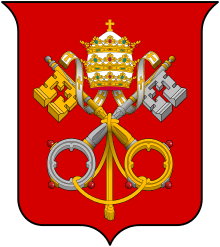Servant of the servants of God
Servant of the servants of God (Latin: servus servorum Dei)[1] is one of the titles of the pope and is used at the beginning of papal bulls.[2]
History
Pope St. Gregory I (pope from 590 to 604) was the first pope to use this title extensively to refer to himself as Pope,[3] reportedly doing so as a lesson in humility for the Archbishop of Constantinople John the Faster, who had been granted the title "Ecumenical Patriarch" by the Byzantine Emperor: the humble title "Servant of the Servants of God" countervailed the other's claim of power and eminence against the Bishop of Rome (the pope). Some of Pope Gregory's successors used the phrase off and on for some centuries, but they did so regularly only from the 9th century. At times, some civil rulers also used this title, but after the 12th century it came to be used exclusively by the Pope.
Biblical background
This papal title also has a biblical background found in the Gospel according to Saint Matthew, chapter 20, verses 25 to 27:
- 25. But Jesus called them unto him, and said, Ye know that the princes of the Gentiles exercise dominion over them, and they that are great exercise authority upon them.
- 26. But it shall not be so among you: but whosoever will be great among you, let him be your minister;
- 27. And whosoever will be chief among you, let him be your servant.
References
- ↑ Gabriel Adeleye, Kofi Acquah-Dadzie, Thomas J. Sienkewicz, World dictionary of foreign expressions: a resource for readers (1999) "Servus servorum Dei", p. 361.
- ↑ Ian Robinson The papal reform of the eleventh century p326 - 2004 "Gregory bishop, servant of the servants of God, to the archbishops, bishops , dukes, counts and the greater and lesser men in the kingdom of the Germans, greeting and apostolic blessing."
- ↑
 Herbermann, Charles, ed. (1913). "Servus servorum Dei". Catholic Encyclopedia. New York: Robert Appleton Company.
Herbermann, Charles, ed. (1913). "Servus servorum Dei". Catholic Encyclopedia. New York: Robert Appleton Company.
